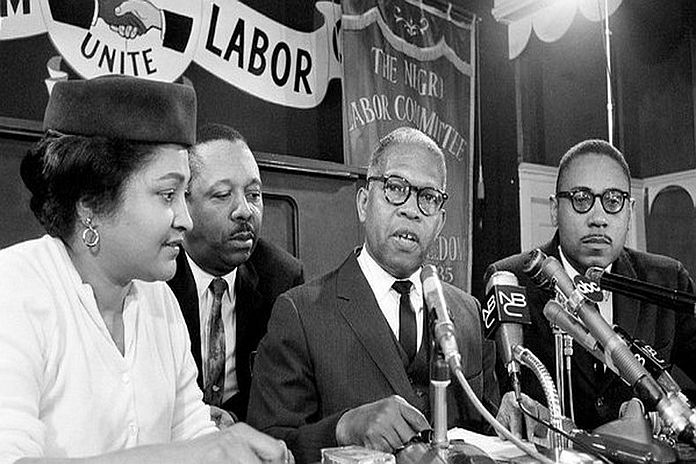By Earl Bousquet
When I saw 96-year-old Cicely Tyson, very-much-alive in a January TV interview, I remarked to one of my two sons also watching that ‘She looks and sounds damn good and well, for her age …’
I mentioned some of the movies I’d seen her star in and jokingly remarked too that ‘She doesn’t look like COVID-19 knew her address …’
But both showed surprise when I quipped, ‘It’s probably the Caribbean blood in her …’
I explained that while Tyson was born in East Harlem on December 19, 1924, she was the daughter of Fredericka (Huggins) Tyson and William Augustine Tyson, both from the tiny Caribbean island Nevis – then a British colony and now part of the Federation of St Kitts and Nevis.
I mentioned other ‘American’ screen stars with Caribbean roots and went on to name Sidney Poitier (born in The Bahamas) star of ‘To Sir With Love’ and Serge Nubret of Guadeloupe, who starred in ‘Sons of Thunder’.
I pointed out too that at the political level in the USA, Louis Farrakhan’s mother was from St Kitts and his father from Jamaica, Malcolm X’s mother was from Grenada and Kwame Ture (who married South Africa’s singing star Miriam Makeba and later formed the All-African People’s Revolutionary Party) was born in Trinidad and Tobago.
Many more Caribbean sons and daughters who sought better lives in America in the 20th century left deep roots and long trails that eventually got lost between their popularity and adopted nationality.
For example, the first Black president of the Borough of Manhattan in New York was a Saint Lucian named Hulan Jack, who left home in 1906 with a meagre education and worked odd jobs until 1940, when he was elected to the state assembly – and re-elected seven times.
Jack was Borough president from 1954 to 1961, after which he was forced to resign on a ‘conflict of interest’ claim. But Jack’s online biography also states he ‘established a long record as the untiring author of legislation for human rights and against racial discrimination of any type.’ And it adds, ‘Though his bills usually fell by the wayside, he remained convinced that he was not wrong, but merely ahead of his time.’
His record on fighting for legislation to protect Black rights in New York sounds very much like that of John Conyers, his fellow Democratic legislator who just over two decades later put the HR-40 Reparations Bill on the Congressional table – and tabled it every year since 1984 – also dying (in 2020) before seeing it become law.
But ask the average Saint Lucian today about Hulan Jack and the answer will (most likely) be: ‘Hulan who?’ The number of Caribbean people who made their mark in America is higher than known, most having had to swear allegiance to Uncle Sam – and no longer to Uncle Joe.
You’d never believe that former US Attorney General William Holden’s mother was Barbadian; and only when Kamla Harris was elected vice president did America do all to let the world know her estranged father is ‘Jamaican’ and her mother ‘Asian’ – to paint her as ‘coloured’ and ‘black’ when appropriate.
And Dominica-born Baroness Scotland, the former UK Attorney General and current Secretary-General of The Commonwealth was forever sworn to the Union Jack.
Caribbean figures also contributed to the liberation of Africa and assisted in charting paths of the first independent former British colonies on the continent, among them:
- Saint Lucia’s Sir Arthur Lewis, who contributed to Ghana’s first national economic plan under president Kwame Nkrumah;
- Dominica’s Sir Telford Georges, who was the first chief Justice of Tanzania;
- Saint Lucia’s Sir Darnley Alexander, the first chief Justice of the State of Niger (Nigeria);
- Guyana’s Walter Rodney lectured in Tanzania and other newly-liberated or independent African states; and a
- Saint Lucian architect, Neville Skeete, drew the plan for the first Central Bank of Nigeria.
Cicley Tyson, in her last interview, spoke of the stellar determination of people of colour in her time to overcome all obstacles placed in their way on their roads to the achievement of their hopes and dreams.
Commenting on the ‘Me Too’ movement’s success in exposing the naked exploitation of vulnerable women actors of all colours over time, she applauded today’s victories, but said while she knew she was a victim, she did not let that horrible factor ever force her to take her eyes off her ultimate goal – of shining her Black beauty on America’s silver screen.
Caribbean people have footprints all over the globe, but finding them in one place is still very much a wild dream.
Today’s Caribbean students have been successfully weaned away from selecting History as a subject for annual exams, forcing learned educators to press for making it a compulsory subject, lest they grow-up not knowing their roots.
This situation also cries, even begs for urgent change, in this age when climate change and regime change are made to sound like the only changes we should strive for in these times.
Legendary Black American ‘Hollywood’ stars Samuel L. Jackson and Danny Glover have been seeking and tracing their roots, Jackson’s search taking him to Gabon and Glover has identified with Caribbean issues like telling the real truth about Haiti’s role and place in world history, the Caribbean’s bid for reparations from Europe for Slavery and Native Genocide and the exiled Caribbean Garifuna nation’s right to a homeland.
But the Caribbean must trace its roots around the world so students preparing to shape the region’s tomorrow can be more certain about from whence they cometh, to prepare them to better handle the challenges and opportunities that lie ahead for the rest of the 21st Century and the third millennium.





